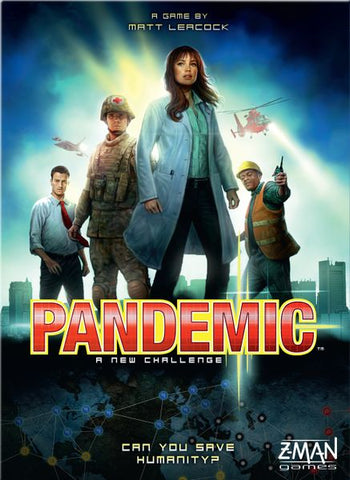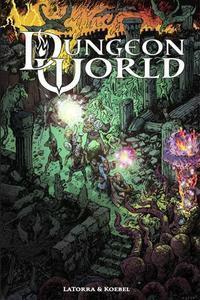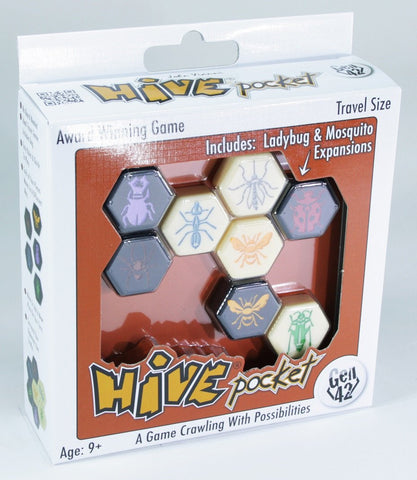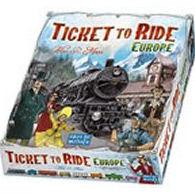
Co-operative Board Game For 2-4 players, ages 10+, playing time around 60 minutes.
In Pandemic, several virulent diseases have broken out simultaneously all over the world! The players are disease-fighting specialists whose mission is to treat disease hotspots while researching cures for each of four plagues before they get out of hand.
The game board depicts several major population centers on Earth. On each turn, a player can use up to four actions to travel between cities, treat infected populaces, discover a cure, or build a research station. A deck of cards provides the players with these abilities, but sprinkled throughout this deck are Epidemic! cards that accelerate and intensify the diseases' activity. A second, separate deck of cards controls the "normal" spread of the infections.
Taking a unique role within the team, players must plan their strategy to mesh with their specialists' strengths in order to conquer the diseases. For example, the Operations Expert can build research stations which are needed to find cures for the diseases and which allow for greater mobility between cities; the Scientist needs only four cards of a particular disease to cure it instead of the normal five—but the diseases are spreading quickly and time is running out. If one or more diseases spreads beyond recovery or if too much time elapses, the players all lose. If they cure the four diseases, they all win!
The 2013 edition of Pandemic includes two new characters—the Contingency Planner and the Quarantine Specialist—not available in earlier editions of the game.
Designed by Matt Leacock
Review by Alan How:
I'd heard much about the game before I played it. This is an unusual event and I was really keen to play as soon as I could. Games from US companies come to the UK at different speeds. Some are dropped off on their way from Germany while others like Z-Man games take a variable amount of time. The news on the wires from the US for Pandemic was really positive which only increased my desire to play it quickly. Matt Leacock had previously designed Lunatic Loops, which was a game about car racing, so Pandemic is a way off that theme.
For a start it is a cooperative game, and there aren't (EDIT: weren't) that many of those. The Geek says there are hundreds, but I think they mean games that feature cooperative elements. The ones that spring readily to mind are the Lord of the Rings games and expansions from Knizia and Acid Rain (Saurer Regen) a game about protecting a tree from acid rain that came out in the early 1980's. Given this heritage, what sort of game should I expect? Well the good news is that Pandemic is a well put together game that takes no more than an hour, even with people who want to ponder before making their plans. The game board features a map of the world with links between cities. The cities are coloured in one of the four colours of the diseases - so the cities of the Far East are red, while of Western Europe are blue. The colours determine the type (colour) of the disease that will break out, and because the colours are all in one area, this helps the diseases to spread. The object of the game is to overcome three of the four major diseases before they spread across the world. To do this players cooperate using cards in their hands and the special powers that come from their role to reduce the risk of outbreaks and ultimately find cures for these diseases. Each player receives a role card and a set of player cards. The role card provides a special game benefit to that player while the other cards show cities on the board, and a colour that matches the four diseases. The map is populated with a starting set of diseases from each of the four types by using another deck of cards called the infection deck. The diseases are shown on the map as cubes in the colour of that disease. Some cities will start with 3 cubes (the most), others with 2 or 1, but the majority of cities are disease free. The significance of the number of cubes is that a maximum of 3 are allowed in a city before the outbreak starts to spread and adjacent cities (linked by a line) become infected. The players start in Atlanta which is the American home of The Centers for Disease Control and Prevention, an agency that focuses national attention on developing and applying disease prevention and control. So this is a good place to start for all players. There are several ways for players to lose, but only one way to win. The mechanisms for losing are: * If all the game markers (cubes) for a disease are used and more are required. * If the city deck is exhausted and more cards are required. * If too many of epidemics have taken place. The only way for the players to win is to obtain the cures to the diseases. It may appear that the odds look stacked up against the players, but the collective options for players allow for some coordinated action to increase their chances. For me, there are two game systems that really make the game work well. The first is the range of movement options for the players that encourage cooperative discussion and the second is the mechanism of dealing with an epidemic of a disease. Each turn a player has four actions they can take and movement will usually be the key feature. The options are moving along the links, with each link counting as an action, so a maximum of four links can be used in this way. The distances that you can travel using links is good and the links wrap around the world so the left and right edges of the board are adjacent. However, this is a slow way to move. A faster solution is to use a player card from your hand. If you are located at that city you can hand in the card and move to any other city in the world. Obviously this is a great way to travel, but you have to start from the city on the card. A third travel solution is to use a city card, but this time the city is your destination, rather than your start point. The advantage is that you can use it from any city, but you arrive at the city on the card. Player cards are also used to cure diseases, and having 5 of the same colour in your hand and moving to a research station will cure that disease. So using them for travel can limit the options on the ability to collect sets of cards. The final regular option is to move (for one action) from one research station to another. The game begins with one research station in Atlanta and 5 more can be built anywhere by handing in the city card, while having your game marker present in that city. Once they are built - ideally right across the world - movement options increase dramatically. Not only does it reduce card use, the time taken to get to outbreaks of diseases really comes down. Another action which can be taken is treating the disease in the city where your game marker is located. Normally each treatment removes one cube back to storage and off the map, but the Medic, which is another player role, treats all the cubes rather than just one. So you can see why movement is crucial to the game and how well the designer has provided options for players to consider. The other core system is the way that diseases continue to focus on specific cities. At the beginning of the game the city deck of cards is seeded with epidemic cards. The number indicates how difficult the game can be. An easy game is to have 4 of these in the deck, while a difficult game is to have 6. At the end of each player's turn, 2 infection cards are revealed from the deck. These show the cities where disease is spreading. Usually this adds one cube to the city. This city card is then discarded. When an epidemic card from the player's deck of cities is revealed, the current discarded set of cities where diseases have spread (including the cities that seeded the map at the beginning of the game) are reshuffled and placed on top of the infection deck. This means that future cards (taken each turn at the conclusion of each player's turn) will re-infect the cities that are already diseased. This creates an impetus for players to deal with diseases where the cubes have already reached 3 in a city in order to reduce the risk of outbreaks. It also ensures players recognise the danger from one disease spreading too widely across the world as the first losing criterion might be reached. Together these key game systems make the game. Options for moving provide players with the need to discuss the fastest routes and how to minimise risks, while the spread of diseases causes tension around which cities will be infected and at which rate. However, this is not all. The role cards are permanent rule breakers enabling players to meld the options available to solve problems that the rules present. For example, the Scientist can cure diseases with only four (rather than five) cards of the same colour so the player playing that role will tend to collect cards. Passing cards is fairly difficult. Both players have to be in the same city and the only card that can be passed is the city where they are located. This can be achieved and is probably necessary but another role - the Researcher - allows this to happen more easily by being able on their turn to pass any cards to a player located in the same city, which is a significant benefit. The final game system that could cause players to lose is the outbreak, where the 8th outbreak will end the game. I have found that this is less likely in the easy games of course, but another significant worry for players in the difficult settings. Other tweaks in the game are a set of special cards that are part of the players' city deck and allow actions like helicoptering any player to any city.
I have tried the game with 2, 3 and 4 players; at all the difficulty levels; and with both regular and non regular gamers, and it works all the time. The game systems are intuitive so it is easy to pick up and I have found that non-gamers like the systems and especially the cooperative nature of the game. The presentation is excellent and rules are clearly presented, so Pandemic is a hit on my game table.







